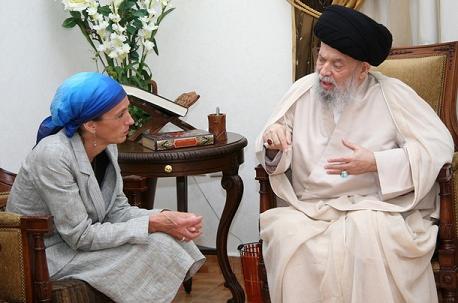By Rami G. Khouri
Editor's comment: As is the case with France and their ban on the burqa, the real issue in this sad tale for Britain is the loss of their national sovereignty to the Zionist establishment in the UK and Israel. The global issue is Israel's aggression and press for war on its neighbors through European foreign policy. Ambassador Frances Guy was forced to apologize for her honesty and for doing her job as an ambassador. (photos added to original article by Axis of Logic)
- Les Blough, Editor
 |
|
Lebanon's Sayyed Mohamad Hussein Fadlallah and Frances Guy,
British Ambassador to Lebanon in a cordial meeting in Beirut, June, 2008 |
Two fascinating yet troubling incidents took place in the past week related to American and British public figures – a British ambassador and an American journalist – who had their fingers burned for acknowledging the deep respect that the late Sayyed Mohammad Hussein Fadlallah, the Lebanese Shiite Muslim religious figure, enjoyed throughout Lebanon and the Islamic world.
The British ambassador to Lebanon, Frances Guy, said Sunday she regretted “any offense” caused by a blog post two days earlier in which she had praised Fadlallah for being a man of spiritual and intellectual depth. She had written that, “When you visited him you could be sure of a real debate, a respectful argument and you knew you would leave his presence feeling a better person.”
|
|
| “When you visited [Fadlallah] you could be sure of a real debate, a respectful argument and you knew you would leave his presence feeling a better person.” - Amb. Frances Guy |
That gesture reflected both the best of her own character as a decent human being and her professionalism as a diplomat whose job is to know the society where she is posted, with all its nuances. The convergence of those two qualities, it seems, may have been too much for the British government. The Foreign Office quickly removed her original comments, saying that she had expressed her personal views that clashed with official policy. It also noted, “While we welcomed his progressive views on women’s rights and interfaith dialogue, we also had profound disagreements – especially over his statements advocating attacks on Israel.”
Guy’s latest blog Sunday included her expression of regret for offending anyone. She explained correctly that the original blog, “was my personal attempt to offer some reflections of a figure who while controversial was also highly influential in Lebanon’s history and who offered spiritual guidance to many Muslims in need.”
Fadlallah’s death also created problems for Lebanese-born Octavia Nasr, senior editor with CNN television and a long-time analyst of the Arab world for that company. She was fired last week after sending out a personal tweet praising Fadlallah as “one of Hizbullah’s giants I respect a lot.”
After losing her job for expressing a personal opinion that also happened to be an honest one (if slightly inaccurate, as he was not formally a Hizbullah man), Nasr later said of her original statement via Twitter that, “it was an error of judgment for me to write such a simplistic comment and I’m sorry because it conveyed that I supported Fadlallah’s life’s work. That’s not the case at all.”
What do we learn from these incidents? Two main issues come to mind. The first is about the true commitment of the United States and the United Kingdom to the principles of freedom of speech and press. If knowledgeable people like Guy and Nasr get punished, humiliated or merely slapped on the wrist for making sincere personal statements about important public issues, then why should anyone take seriously the American and British governments and their armies that come to our region regularly to promote democracy and freedom of speech and press? Do the US and UK governments want us to act as free men and women, except when the issue touches Israeli sensitivities?
The second is about nuanced analysis and assessment of Arab societies and leaders, including in this case a man like Fadlallah who elicited enormous respect but also angered many in Israel and the West for supporting military resistance to the Israeli occupation of south Lebanon. Instead of seeing him in black and white only, it is more sensible to acknowledge his many prevalent humanistic qualities while also disagreeing with aspects of his worldview – as the two ladies hinted at in their subsequent statements. But, again, this seems forbidden when the matter includes active opposition to Israeli policies.
We see here once again the failure of the prevailing Israeli-driven Anglo-American view that anyone who opposes or actively fights Israel is discounted and boycotted as a terrorist.
No other aspect of one’s life, values or actions can be examined or acknowledged; we exist only insofar as we acquiesce to Israeli demands.
This is not only an enormous tragedy and waste in terms of perpetuating the destruction caused by the Arab-Israeli conflict; it is also a massive dagger in the heart of Anglo-American-Israeli rhetoric about their respect for democracy, and their desire to promote personal and political freedoms in our region. Every time a US or British government official speaks to us about facing truth and reality, we will recall these two minor incidents and ask them when they plan to break free from the hysteria, hypocrisy and political blackmail that still define so many aspects of Anglo-American-Israeli relations. We in the Middle East are used to this sort of racist intellectual terrorism; American and British citizens who occasionally dare to speak accurately about the Mideast and its people are still learning about the full price of the truth when Israeli interests are in the room.
Source: The Daily Star (Lebanon)

